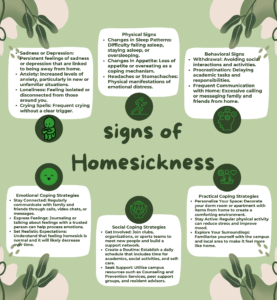Definition of Homesickness
Homesickness is characterized by feelings of distress and discomfort caused by separation from home and familiar environments. It often includes longing for familiar surroundings, people, and routines. This is quite common among college students who are experiencing living away from home for the first time. Studies indicate that up to 70% of first-year college students experience homesickness to some degree. Therefore, you are not alone if you are experiencing homesickness. The intensity of homesickness can vary, with some students experiencing mild discomfort while others face severe emotional distress. For some students, homesickness can affect their academic performance, social interactions, and overall well-being.
Recognizing the Signs of Homesickness
Emotional Signs
- Sadness or Depression: Persistent feelings of sadness or depression that are linked to being away from home.
- Anxiety: Increased levels of anxiety, particularly in new or unfamiliar situations.
- Loneliness: Feeling isolated or disconnected from those around you.
- Crying Spells: Frequent crying without a clear trigger.
Physical Signs
- Changes in Sleep Patterns: Difficulty falling asleep, staying asleep, or oversleeping.
- Changes in Appetite: Loss of appetite or overeating as a coping mechanism.
- Headaches or Stomachaches: Physical manifestations of emotional distress.
Behavioral Signs
- Withdrawal: Avoiding social interactions and activities.
- Procrastination: Delaying academic tasks and responsibilities.
- Frequent Communication with Home: Excessive calling or messaging family and friends from home.
Strategies to Cope with Homesickness
Emotional Coping Strategies
- Stay Connected: Regularly communicate with family and friends through calls, video chats, or messages.
- Express Feelings: Journaling or talking about feelings with a trusted person can help process emotions.
- Set Realistic Expectations: Understand that feeling homesick is normal and it will likely decrease over time.
Social Coping Strategies
- Get Involved: Join clubs, organizations, or sports teams to meet new people and build a support network.
- Create a Routine: Establish a daily schedule that includes time for academics, social activities, and self-care.
- Seek Support: Utilize campus resources such as Counseling and Prevention Services, peer support groups, and resident advisors.
Practical Coping Strategies
- Personalize Your Space: Decorate your dorm room or apartment with items from home to create a comforting environment.
- Stay Active: Regular physical activity can reduce stress and improve mood.
- Explore Your Surroundings: Familiarize yourself with the campus and local area to make it feel more like home.

